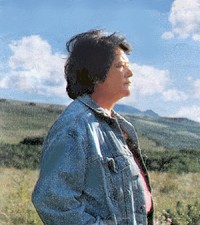Is Gover qualified?
Questions arise about NMAI choiceThe first of two essential qualifications is the ability to raise funds in an Indian country environment now highly attuned to business and administrative ethics. Gover's placement may have derailed any, if not all, potential for tribal support. Stated Cobell, "What this means is that the Smithsonian has hired someone to head this important museum who has literally thumbed his nose at Indian people--some of the poorest people in the nation." Question number one: Why would tribal leaders, who have worked so hard to fight for justice and lift their peoples out of poverty, donate to the NMAI when its director was found in contempt over the mishandling of Indian trust accounts for thousands of impoverished American Indians?
The second of two essential qualifications is experience in administering a large and complex museum. Gover has no experience in the museum field, much less experience guiding any museum approaching the scope and scale of the NMAI. It is here, were Indian country to swallow, hook, line and sinker the storyline that this is a good thing, where skepticism necessarily emerges. Question number two: Why is it better that Gover possess no museum qualifications whatsoever?Why Kevin Gover is the new NMAI directorIn 1997, the United States Senate confirmed Kevin Gover as the U.S. Interior Assistant Secretary for Indian Affairs. He was the seventh person and among the youngest ever to serve in that office, which is a sub-cabinet position and the highest office for American Indian policy in the federal government. As Assistant Secretary, he was the policy head of the nationwide Bureau of Indian Affairs. His responsibilities included oversight of Haskell Indian Nations University, the Southwest Indian Polytechnic Institute, and more than 180 other Indian schools. He also oversaw the work of the Indian Arts and Crafts Board and its three museums in Anadarko, OK, Browning, MT, and Rapid City, SD.
For the past four years, Prof. Gover has been teaching federal Indian law, legal method and process, administrative law, and the history of federal Indian policy at the Sandra Day O'Connor College of Law at Arizona State University, the home of one of the best, if not the best, Indian law program in the United States. He is also co-Executive Director of the American Indian Policy Institute at ASU. His dedication to Indian education and his experience in academe will serve him well as embarks at the helm of NMAI, a distinguished educational platform for presenting the history and rights of Native American nations and people to a global audience.


1 comment:
Writerfella here --
No.
All Best
Russ Bates
'writerfella'
Post a Comment